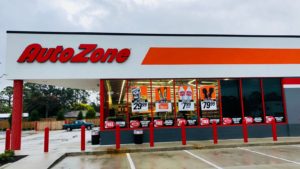Of course, today’s fractional trading era – where a piece of even the highest-priced stock can generally be bought for a few bucks – means stock splits are more psychological window dressing than anything else. They’re a way for executives to point to a stock and say, “Our stock price made it this high already – better get some now while it’s €˜cheap’ before it goes back up.”
Though stock splits have no fundamental effect on a company’s valuation, there still tends to be a snowball effect post-split, whether due to renewed popular interest or as a purely psychological play. For example, Tesla’s (NASDAQ:TSLA) 2020 stock split preceded a massive 60% run-up, and Amazon’s (NASDAQ:AMZN) 2022 split saw shares rise 10% over the following month.
These three stocks, like Chipotle, have staggeringly high per-share pricing that makes them prime stock split candidates, even in an era of market turbulence and uncertainty.
AutoZone (AZO)

A whopping 93% institutional ownership coupled with a staggering $117.30 free cash flow per share stat in 2023 makes AutoZone (NYSE:AZO) an obvious stock split candidate. As I’ve discussed before, high institutional ownership coupled with high free cash flow per share are recipes for surging per-share pricing. The institutional owners encourage aggressive buyback programs to push the price higher with fewer tax implications than dividend distributions, much like we saw with Chipotle’s slew of institutional heavyweights, including Bill Ackman’s Pershing Square hedge fund. Trading over $3,000 per share today, a stock split could spur AutoZone’s growth into a new era triggered by retail interest, especially considering the stock’s fairly low volume averages.
Beyond its stock split potential, AutoZone stands out as a solid value stock for investors looking for market stability. With a 0.70 beta and 6.37% buyback yield, don’t be deterred by the high per-share pricing – AutoZone is a solid buy for portfolio stability alone.
Seaboard Corp (SEB)

Priced well above $3,000 per share, global agriculture and transport company Seaboard Corp (NYSEAMERICAN:SEB) is another prime stock split candidate. Seaboard Corp bucks the “cash cow thesis” covered above €”despite its $212.95 free cash flow per share stat, institutional owners claim less than 25% of total shares outstanding. Of course, there’s good reason for the divergence that ultimately reinforces the free cash flow per share/stock split candidacy interplay: the company’s founding family, the Breskys, own more than half the company’s shares. The family is, of course, incentivized to push per-share pricing higher with as little tax impact as possible. That’s why the company’s relatively paltry dividend yield, 0.28%, pales compared to its buyback yield, which sits at an astounding 19.44%.
Practically speaking, the Bresky family has little incentive to target a stock split. With such a substantial stake in the company, the family enjoys a rare mix of public stock liquidity alongside privately held company control and preferred capital structuring. But that doesn’t mean retail should avoid Seaboard Corp. The company’s longstanding history of stability and solid returns could make it a staple in a well-rounded portfolio, much like AutoZone.
Booking Holdings (BKNG)

Booking Holdings (NASDAQ:BKNG), known for its array of travel services, including Priceline and Kayak, stands out as another stock split candidate. Shares trade above $3,500 today, and the company’s robust financial performance and an improving travel outlook may mean big things on the horizon. A weak forecast in February pushed shares down about 10%, making today’s pricing an ideal entry point for fractional trading even if a stock split never materializes.
The company’s free cash flow per share topped out at $193.66 in 2023 and, as you likely expected by now, institutional ownership sits above 90%. True to form, dividends contribute a slim 0.25% to the firm’s 8.87% total yield.
Analysts anticipate further growth for Booking Holdings as the global travel market rebounds from the pandemic-induced downturn. The company’s latest earnings report reinforces the optimistic outlook, which showcased a 16% year-over-year increase in quarterly gross travel bookings and a 24% annual rise in the same metric. Additionally, annual income surged by 40% following a 25% increase in revenue, indicating that management successfully handles higher interest rates and enhances profit margins through careful cost management.
On the date of publication, Jeremy Flint held no positions in the securities mentioned. The opinions expressed in this article are those of the writer, subject to the InvestorPlace.com Publishing Guidelines.
Jeremy Flint, an MBA graduate and skilled finance writer, excels in content strategy for wealth managers and investment funds. Passionate about simplifying complex market concepts, he focuses on fixed-income investing, alternative investments, economic analysis, and the oil, gas, and utilities sectors. Jeremy’s work can also be found at www.jeremyflint.work.
